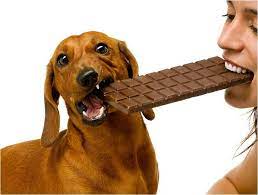Introduction
Pets are family members, and we naturally want to share everything with them, including our food. However, many human foods can be harmful or even deadly to our furry friends. Understanding which foods pose risks is crucial for keeping your pets safe and healthy. In this article, we’ll explore various human foods that can hurt your pet and provide tips on preventing accidental ingestion.
Why Certain Human Foods Are Dangerous to Pets
Pets metabolize food differently than humans do, making some human foods toxic to them. Common misconceptions about pet safety often lead to unintended consequences. For example, what seems like a harmless treat could result in a serious health emergency.
Common Harmful Foods for Dogs
Chocolate
Chocolate contains theobromine, which is highly toxic to dogs. Even small amounts can cause symptoms like vomiting, diarrhea, rapid breathing, increased heart rate, and seizures. Dark chocolate is more dangerous than milk chocolate due to its higher theobromine content.
Grapes and Raisins
Grapes and raisins can lead to sudden kidney failure in dogs. Symptoms of ingestion include vomiting, lethargy, and decreased appetite. Immediate veterinary attention is required if a dog consumes these fruits.
Onions and Garlic
Onions and garlic, whether raw, cooked, or powdered, can damage a dog’s red blood cells, leading to anemia. Signs of poisoning include weakness, vomiting, and breathing difficulties. Repeated exposure or ingestion of large amounts can be fatal.
Common Harmful Foods for Cats
Alcohol
Even small amounts of alcohol can be extremely toxic to cats. It affects their liver and brain, leading to symptoms like vomiting, diarrhea, difficulty breathing, tremors, and in severe cases, coma or death.
Caffeine
Caffeine is found in coffee, tea, chocolate, and many energy drinks. It stimulates a cat’s nervous system, causing rapid breathing, heart palpitations, restlessness, and muscle tremors. Severe cases can result in death.
Raw Fish
Feeding raw fish to cats can cause a thiamine (vitamin B1) deficiency, leading to neurological problems like lack of coordination, convulsions, and in severe cases, death.
Surprising Foods That Are Harmful to Both Dogs and Cats
Xylitol
Xylitol, a sugar substitute found in sugar-free gum, candies, and baked goods, is highly toxic to pets. It causes a rapid release of insulin, leading to hypoglycemia (low blood sugar), seizures, liver failure, and even death.
Avocado
Avocado contains persin, which can cause vomiting and diarrhea in dogs and cats. While the flesh is less toxic, the pit poses a choking hazard and contains higher levels of persin.
Macadamia Nuts
Macadamia nuts can cause weakness, depression, vomiting, tremors, and hyperthermia in dogs. While the exact toxin is unknown, it can lead to severe neurological symptoms. The effects on cats are less known but likely similar.
Dangerous Dairy Products
Milk and Cheese
Many pets are lactose intolerant, meaning they lack the enzyme lactase needed to digest lactose found in dairy products. Consuming milk or cheese can lead to digestive issues like diarrhea and upset stomach.
Foods with Bones
Cooked Bones
Cooked bones, especially from poultry, can splinter and cause choking, blockages, or tears in your pet’s digestive system. Always avoid giving cooked bones to your pets and opt for safer chew alternatives.
High-Sodium Foods
Salt and Salty Snacks
Excessive salt intake can lead to sodium ion poisoning in pets, causing symptoms like vomiting, diarrhea, tremors, elevated body temperature, and seizures. In severe cases, it can be fatal.
Fatty Foods
Bacon and Fat Trimmings
Fatty foods like bacon and fat trimmings can cause pancreatitis in pets, an inflammation of the pancreas that can be painful and potentially fatal. Symptoms include vomiting, diarrhea, and abdominal pain.
Yeast Dough
Raw Dough
If ingested, raw yeast dough can expand in your pet’s stomach, causing severe pain and potential stomach rupture. The fermentation process also produces alcohol, which can lead to alcohol poisoning.
Fruits With Pits
Cherries and Peaches
The pits of fruits like cherries and peaches contain cyanide, which is poisonous to pets. Ingesting these pits can cause symptoms such as difficulty breathing, red gums, and shock, requiring immediate veterinary care.
Safe Alternatives and Treats
Instead of risky human foods, opt for pet-safe alternatives like carrot sticks, apple slices (without seeds), and specially formulated pet treats. These provide health benefits without the risks.
Preventing Accidental Ingestion
To prevent your pet from eating harmful foods, store food securely out of reach, train pets to avoid begging, and educate family members about the dangers of sharing human food with pets.
What to Do If Your Pet Eats Something Harmful
If you suspect your pet has ingested a harmful food, contact your veterinarian immediately. Provide as much information as possible about what was eaten and how much. Acting quickly can save your pet’s life.
Conclusion
Being aware of the human foods that can harm your pets is essential for their health and well-being. By understanding the risks and taking preventive measures, you can ensure that your furry friends stay safe and healthy.
FAQs
How can I tell if my pet has eaten something toxic?
Symptoms of toxicity vary but can include vomiting, diarrhea, lethargy, and abnormal behavior. If you suspect poisoning, contact your vet immediately.
What are some safe treats I can give my pet?
Safe treats include carrot sticks, apple slices (without seeds), and commercial pet treats formulated for your pet’s dietary needs.
How can I pet-proof my kitchen?
Keep food stored securely in cabinets or the refrigerator, use child-proof locks if necessary, and train your pet to stay off counters and tables.
What should I do if I’m unsure if a food is safe for my pet?
When in doubt, it’s best to avoid giving your pet human food. Consult your veterinarian if you’re unsure about the safety of a particular food.
Are there any human foods that are beneficial for pets?
Some human foods like plain cooked chicken, pumpkin, and blueberries can be beneficial for pets in moderation. Always introduce new foods gradually and consult your vet.


